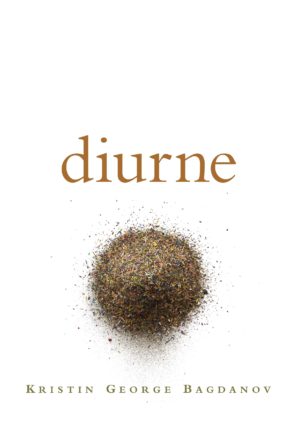In Their Own Words
Kristin George Bagdanov on “Diurne”

Diurne (an excerpt)
1
In the unlit lampshade, a stillness
I satisfy my need by defining my need. My desire is everyone else telling me what to want to be.
The heart beats by seeing its EKG saying so. Cardiac event recorder in which the horizon is always rupture without revelation.
Undertow pulls the legs which way the arms this way. Image of contra without diction.
If social being is consciousness, then these rocks I cut my feet against, my blood in the water, makes this, too
Two waves break against each other, neither the aggressor. Both make a mouthful of salt.
I have gone into a wave laughing. I have seen how calm the explanation.
This is not an attempt at immediacy. This is a poem written under duress. I’m not authentic but an aura lingers at my lips.
This mouth imbibes microplastics and runoff. I swallow with and without knowledge. This is not a treatise or confession. Both have their states and I am neither one of them.
Mineral made bone made knowledge. Open your hand. Find it a shovel; give it a gun. Callus the space between.
I am told the mess of the subject is what makes a poem interesting
Cf. the grasp of hoof vs. hand
To that end, I am structuring my feeling. At this end, I make space for each hour to speak.
I wrote that earlier but out of order. I hadn’t considered how it wanted to be beheld.
My desire is everyone else
From Diurne (Tupelo Press, 2019). Reprinted with the permission of the author. All rights resereved.
On “Diurne”
The constraint and condition of possibility for Diurne is “a line each hour of waking / a poem each day of making.” The book is made up of incremental sentences, wages, and fragments of time—my attempts at capturing the dailiness of consciousness over the course of a month. This first poem explores the limits and possibilities of these constraints: how to measure, how to represent, how to structure the relationship between word and world. I wanted to reverse the terms in the romanticized relationship between lyric and labor: a poem that was more perspiration than inspiration. That was a result of work rather than any sort of genius. I was inspired by how procedural projects like Bernadette Mayer’s Memory and Lyn Hejinian’s My Life collectivized the self and trivialized the poetic in ways that produced even more intimacy with the person behind the page. In Diurne, I try (and often fail) to develop a method I call “impersonal intimacy,” offering to the reader different types of personal information—credit card #, address, email, as well as family histories, personal insecurities, and confessions to see what might register as expressions of lyric subjectivity and wondering which is the more intimate: my data or my desires. Or how one expresses or suppresses the other. Oscillating between definitions of personhood as defined by the market, the State, history, philosophy, and poetry, I try in Diurne to rethink what it means to write a personal lyric in 21st century America.



